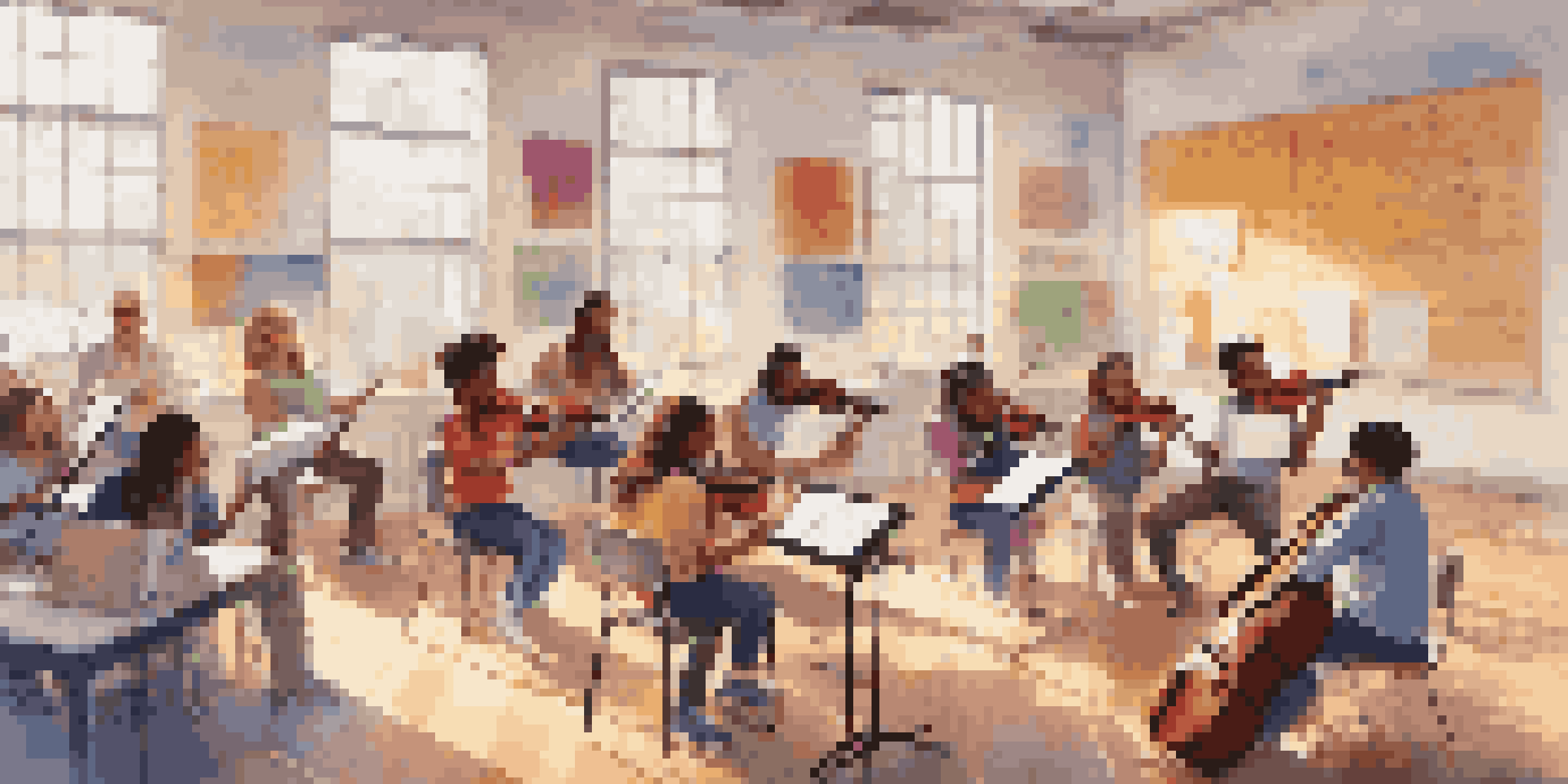The Importance of Music Education in Understanding Genres

Music Education: A Gateway to Genre Appreciation
Music education serves as a vital gateway into understanding different genres. By studying the history, structure, and cultural significance of various musical styles, students gain a deeper appreciation for the music they love. This foundational knowledge allows listeners to connect emotionally and intellectually with the songs they hear.
Music can change the world because it can change people.
For example, learning about the origins of jazz can illuminate why improvisation is so crucial in that genre. Similarly, understanding the roots of rock music can help students appreciate its evolution over time. Such knowledge transforms casual listeners into informed fans.
Ultimately, music education empowers individuals to explore genres beyond their usual preferences, fostering a richer musical landscape. This journey into the world of music not only broadens horizons but also enhances emotional engagement with a variety of genres.
The Role of Historical Context in Music Genres
Every music genre has a unique history that shapes its sound and themes. Understanding these historical contexts can greatly enhance one's appreciation of the music. For instance, the rise of hip-hop in the 1970s was deeply rooted in social and political issues faced by marginalized communities.

When students learn about these backgrounds, they can see how the struggles and triumphs of a culture are reflected in its music. This connection makes listening a more immersive experience, as they can recognize the stories and emotions behind the beats.
Music Education Enhances Genre Appreciation
Studying different musical styles deepens emotional and intellectual connections to music.
Thus, music education encourages students to delve into the past, enriching their present listening experiences. This historical lens allows them to appreciate not just the music, but also the cultural narratives that accompany it.
Technical Skills: The Building Blocks of Genre Mastery
Learning music theory and technical skills is crucial for understanding different genres. These skills provide a framework for analyzing rhythm, melody, and harmony, which are foundational elements in any musical style. For instance, grasping the 12-bar blues structure is essential for anyone wanting to dive into blues or rock.
Without music, life would be a mistake.
As students develop these technical abilities, they become more adept at identifying the characteristics that define genres. This knowledge can be applied when listening to new tracks, allowing them to recognize familiar patterns and influences.
In this way, music education cultivates a deeper appreciation for the craftsmanship behind each genre. The more one understands the technical aspects, the more enriched their listening experience becomes.
Cultural Awareness through Diverse Genres
Music education promotes cultural awareness by exposing students to diverse genres from around the world. Each genre reflects the values, struggles, and celebrations of its culture, making it a powerful tool for understanding different perspectives. For instance, studying reggae can reveal insights into the social issues faced in Jamaica.
This exposure encourages empathy and appreciation for cultural differences, fostering a more inclusive mindset. Students learn to recognize the beauty in diversity, not just in music but in society as a whole.
Historical Context Enriches Listening
Understanding the history behind genres allows listeners to appreciate the cultural narratives within the music.
By engaging with a variety of genres, music education enables students to build connections with people from different backgrounds. This cultural understanding enhances their overall appreciation for music as a universal language.
The Emotional Connection: Music as Expression
Music is a profound form of emotional expression, and education helps students recognize this connection. Different genres evoke varying emotions, which can resonate deeply with listeners. For example, classical music can elicit feelings of tranquility, while punk may stir up feelings of rebellion.
By understanding the emotional intent behind different genres, students can engage more fully with the music. This emotional literacy allows them to explore their own feelings through the lens of various musical styles.
Ultimately, this connection to emotion enhances the overall experience of listening to music. Music education teaches students not only to hear the music but to feel it, enriching their personal and emotional lives.
Collaboration and Community in Music Education
Music education often involves collaboration, fostering a sense of community among students. Whether it's playing in a band or singing in a choir, these collaborative experiences teach the value of teamwork. This is especially relevant in genres like jazz, where improvisation relies on collective creativity.
Through collaboration, students learn to appreciate the contributions of others, recognizing that music is often a communal effort. This understanding can deepen their respect for artists across genres who work together to create something unique.
Collaboration Builds Community in Music
Collaborative music experiences foster teamwork and create lasting social bonds among students.
Thus, music education not only enhances genre understanding but also builds social skills and community bonds. These experiences can lead to lasting friendships and networks, enriching their musical journey.
Lifelong Learning: The Ongoing Journey with Music
Music education instills a love for lifelong learning, encouraging students to continually explore new genres. With the vast array of musical styles available, there is always something new to discover. This curiosity keeps their musical tastes evolving and expanding.
As they delve into different genres, students can find new artists and styles that resonate with them, enriching their lives. This journey can lead to unexpected connections and inspirations, often influencing their own creative pursuits.

Ultimately, the importance of music education lies in its ability to foster a lifelong appreciation for music. It turns casual listeners into passionate explorers of sound, creating a vibrant musical community that thrives on diversity and shared experiences.